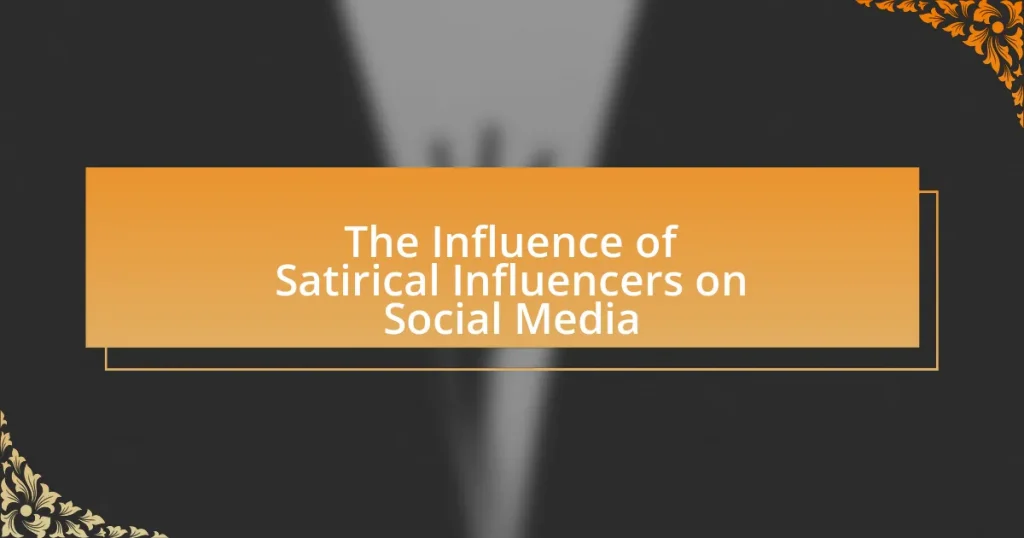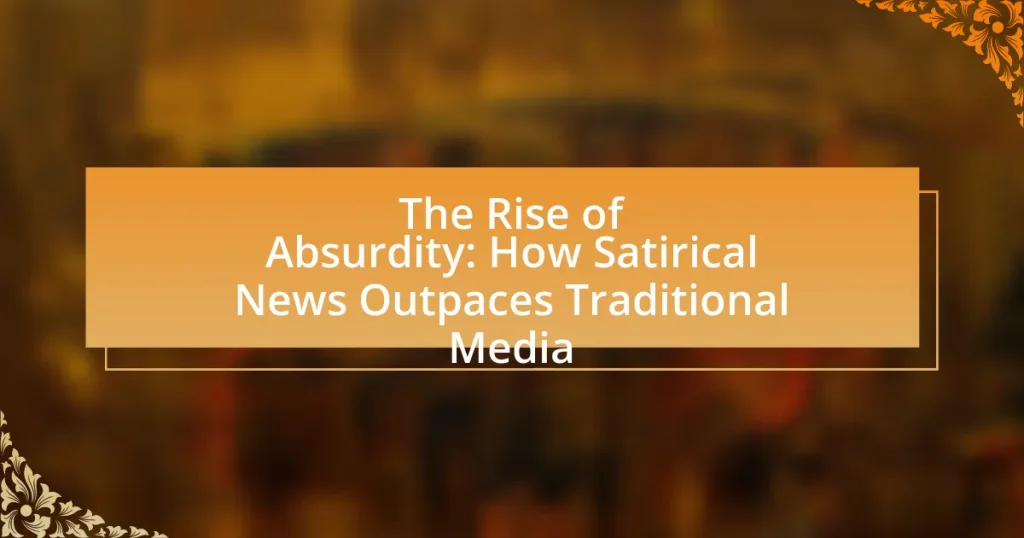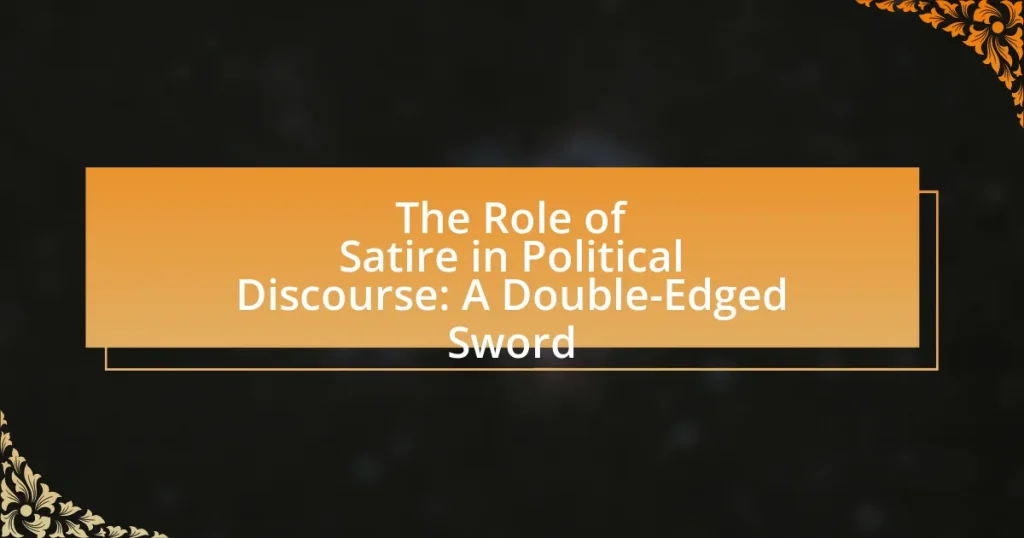Satirical influencers play a significant role in shaping social media discourse by using humor and irony to critique societal norms and political issues. Their content enhances audience engagement, making complex topics more accessible and fostering discussions that can lead to increased political awareness, particularly among younger demographics. This article explores the techniques employed by satirical influencers, their impact on public opinion and traditional media narratives, and the challenges they face, including misinterpretation and backlash. Additionally, it examines the ethical considerations and best practices for aspiring satirical influencers to ensure responsible content creation while maintaining audience engagement.
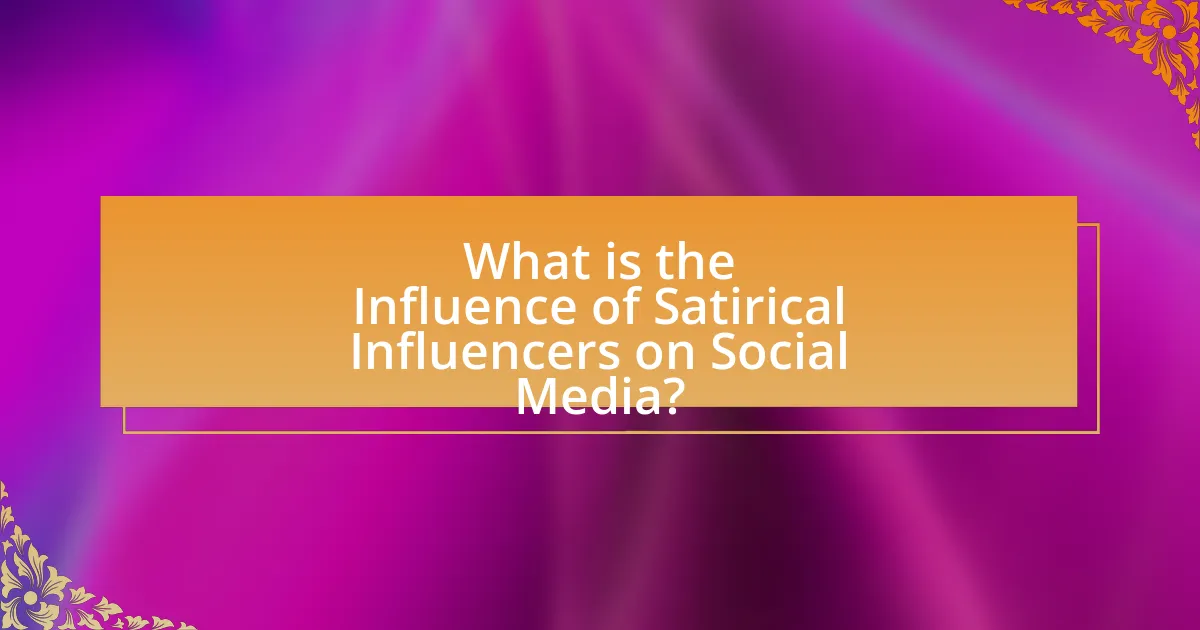
What is the Influence of Satirical Influencers on Social Media?
Satirical influencers significantly shape social media discourse by using humor and irony to critique societal norms and political issues. Their content often engages audiences by making complex topics more accessible and relatable, which can lead to increased awareness and discussion around important issues. For instance, a study published in the journal “New Media & Society” found that satirical content can enhance political engagement among younger audiences, as it encourages them to share and discuss these topics further. This influence is evident in the way satirical influencers can sway public opinion and mobilize followers for social causes, demonstrating their power in the digital landscape.
How do satirical influencers shape public opinion?
Satirical influencers shape public opinion by using humor and irony to critique societal norms and political issues, making complex topics more accessible and engaging. Their content often resonates with audiences, leading to increased awareness and discussion around important issues. For instance, studies have shown that satirical content can enhance political engagement; a 2017 study published in the journal “Political Communication” found that exposure to satirical news increased viewers’ political knowledge and motivated them to participate in political discussions. This indicates that satirical influencers not only entertain but also inform and mobilize their audiences, thereby significantly impacting public opinion.
What techniques do satirical influencers use to engage their audience?
Satirical influencers engage their audience through techniques such as humor, irony, and exaggeration. These methods create relatable content that resonates with viewers, often addressing social or political issues in a lighthearted manner. For instance, by using memes and parody videos, satirical influencers can simplify complex topics, making them more accessible and shareable. Research indicates that humor increases audience retention and sharing behavior, as seen in studies by the Journal of Advertising Research, which found that humorous content is more likely to be remembered and shared than non-humorous content. This strategic use of humor and relatable scenarios effectively captures audience attention and fosters community engagement.
How does humor play a role in influencing perceptions?
Humor significantly influences perceptions by shaping attitudes and beliefs through emotional engagement and cognitive processing. When humor is employed, it can create a positive emotional response, making individuals more receptive to the underlying message. Research indicates that humorous content can enhance message retention and persuasion, as seen in a study published in the Journal of Advertising, which found that humor increases audience engagement and recall of advertisements. This effect is particularly relevant in the context of satirical influencers on social media, where humor can challenge societal norms and provoke critical thinking, ultimately altering perceptions of various issues.
Why are satirical influencers significant in today’s digital landscape?
Satirical influencers are significant in today’s digital landscape because they effectively engage audiences by using humor to critique societal norms and political issues. This engagement fosters critical thinking and encourages discourse among followers, making complex topics more accessible. For instance, platforms like Twitter and Instagram have seen satirical accounts gain millions of followers, demonstrating their ability to shape public opinion and influence cultural conversations. Research indicates that humor can enhance message retention and persuasion, making satirical content a powerful tool for social commentary and activism.
What impact do they have on traditional media narratives?
Satirical influencers significantly reshape traditional media narratives by introducing humor and critique that challenge mainstream perspectives. Their content often highlights societal issues, prompting traditional media to address topics they might otherwise overlook. For instance, satirical influencers like John Oliver and Hasan Minhaj have successfully brought attention to complex subjects such as healthcare and immigration, leading to increased public discourse and media coverage on these issues. This influence is evident in how traditional outlets now incorporate satire into their reporting, reflecting a shift towards more engaging and critical narratives that resonate with younger audiences.
How do they contribute to political discourse?
Satirical influencers contribute to political discourse by shaping public opinion and encouraging critical thinking through humor and satire. They often highlight political issues, expose hypocrisy, and challenge mainstream narratives, making complex topics more accessible and engaging for a broader audience. For instance, platforms like Twitter and TikTok have seen satirical content that critiques government policies or social issues, prompting discussions and debates among users. Research indicates that satirical content can enhance political engagement, as seen in studies showing that viewers of satirical news programs are more likely to discuss political issues and participate in civic activities.
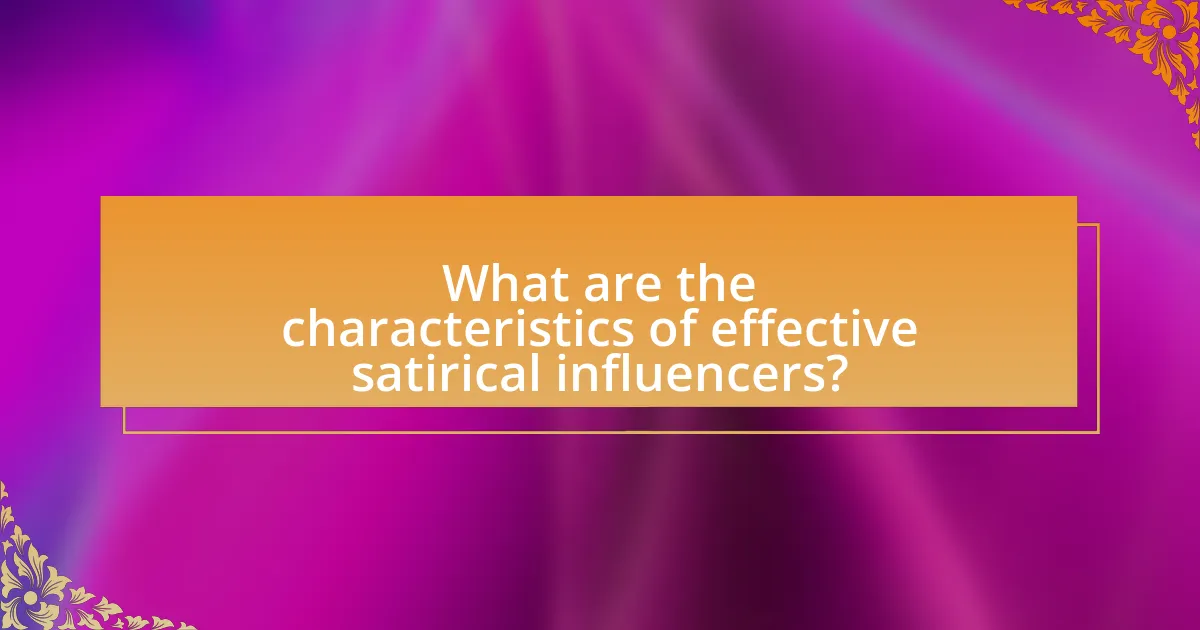
What are the characteristics of effective satirical influencers?
Effective satirical influencers possess sharp wit, a strong understanding of social issues, and the ability to engage audiences through humor. These influencers utilize satire to critique societal norms and political situations, making complex topics accessible and relatable. Their effectiveness is often measured by their ability to provoke thought and discussion, as evidenced by the significant engagement metrics seen in their content, such as shares and comments. Additionally, successful satirical influencers often have a distinct voice and style that resonates with their target audience, allowing them to build a loyal following.
What traits distinguish successful satirical influencers from others?
Successful satirical influencers are distinguished by their sharp wit, keen observational skills, and the ability to engage audiences through humor while addressing serious topics. These influencers effectively use satire to critique societal norms and political issues, making complex subjects accessible and relatable. Their success is often supported by a strong understanding of current events, allowing them to create timely and relevant content that resonates with their audience. Additionally, they possess a unique voice and style that sets them apart, fostering a loyal following. Research indicates that humor can enhance message retention and engagement, which is crucial for influencers aiming to make an impact on social media.
How does authenticity affect their influence?
Authenticity significantly enhances the influence of satirical influencers on social media by fostering trust and relatability among their audience. When these influencers present themselves as genuine and transparent, they create a stronger emotional connection with followers, which increases engagement and loyalty. Research indicates that 86% of consumers consider authenticity important when deciding which brands to support, highlighting the critical role of perceived authenticity in shaping influence. This connection allows satirical influencers to effectively communicate their messages and drive social commentary, making their content more impactful and shareable.
What role does audience interaction play in their effectiveness?
Audience interaction significantly enhances the effectiveness of satirical influencers on social media by fostering engagement and building community. When audiences actively participate through comments, shares, and reactions, it amplifies the reach of satirical content, creating a feedback loop that encourages further interaction. Research indicates that posts with higher engagement rates are more likely to be shared, increasing visibility and impact. For instance, a study by the Pew Research Center found that 64% of social media users engage with content by commenting or sharing, which directly correlates with the effectiveness of influencers in shaping public discourse. Thus, audience interaction is crucial for maximizing the influence and reach of satirical influencers.
How do satirical influencers build and maintain their following?
Satirical influencers build and maintain their following by creating relatable, humorous content that resonates with their audience’s experiences and opinions. They often utilize current events and cultural trends to craft their satire, making their content timely and relevant. Engaging with followers through comments and social media interactions fosters a sense of community, encouraging loyalty. Additionally, consistent posting schedules and collaborations with other influencers expand their reach and visibility. Research indicates that humor in social media content can increase engagement rates, with studies showing that posts with comedic elements receive higher shares and interactions compared to non-satirical content.
What strategies do they employ for audience engagement?
Satirical influencers employ strategies such as humor, relatability, and interactive content to engage their audience. By using humor, they create entertaining content that resonates with viewers, making complex social issues more accessible. Relatability is achieved through personal anecdotes and shared experiences, fostering a sense of community among followers. Additionally, interactive content, such as polls and Q&A sessions, encourages audience participation, enhancing engagement levels. Research indicates that humor increases shareability and audience retention, with studies showing that humorous posts can lead to a 50% increase in engagement compared to non-humorous content.
How important is consistency in content creation?
Consistency in content creation is crucial for building audience trust and engagement. Regularly posting content helps establish a reliable brand identity, which is essential for retaining followers. Research indicates that brands that maintain a consistent posting schedule see a 50% increase in audience engagement compared to those that do not. This consistency reinforces the message and tone of the content, making it easier for audiences to connect with the creator’s voice and style. In the context of satirical influencers on social media, consistent content delivery can enhance their comedic impact and strengthen their influence, as audiences come to expect and look forward to their unique take on current events.
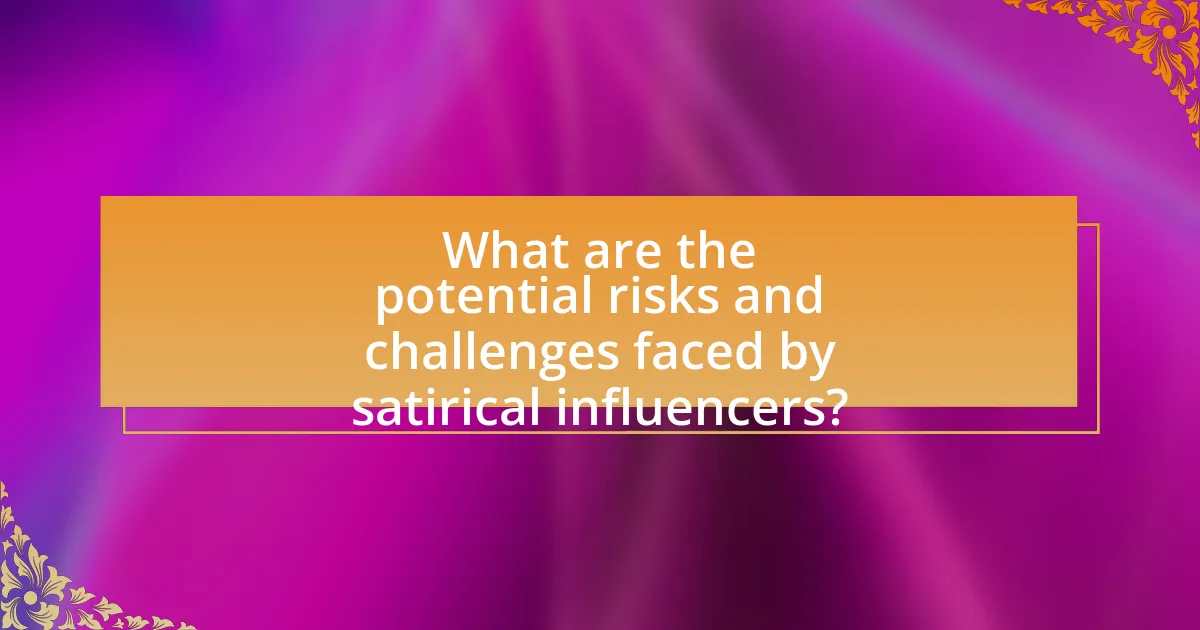
What are the potential risks and challenges faced by satirical influencers?
Satirical influencers face several potential risks and challenges, including misinterpretation of their content, backlash from audiences, and legal issues. Misinterpretation can occur when audiences fail to recognize satire, leading to confusion or offense; for example, a satirical post intended to critique a political figure may be taken literally, resulting in public outrage. Backlash from audiences can manifest as negative comments, loss of followers, or even threats, particularly if the satire touches on sensitive topics. Legal issues may arise from copyright infringement or defamation claims, as seen in cases where satirical content closely resembles original works or targets individuals. These challenges highlight the precarious balance satirical influencers must maintain between humor and responsibility.
What backlash do satirical influencers encounter?
Satirical influencers encounter backlash primarily in the form of criticism and backlash from audiences who may misinterpret their content. This misinterpretation can lead to accusations of insensitivity or promoting harmful stereotypes, as seen in various instances where satire has been taken literally. For example, a study by the Pew Research Center found that 64% of social media users have encountered content they found offensive, which often includes satirical posts. Additionally, satirical influencers may face deplatforming or content removal from social media platforms due to violations of community guidelines, particularly when their humor touches on sensitive topics.
How do they navigate controversies and criticism?
Satirical influencers navigate controversies and criticism by employing humor and irony to deflect negative attention while engaging their audience in dialogue. They often address criticism directly through their platforms, using satire to highlight the absurdity of the criticism itself, which can mitigate backlash and foster a sense of community among followers. For instance, satirical influencers like John Oliver and Hasan Minhaj have successfully tackled controversial topics by blending entertainment with critical commentary, allowing them to maintain relevance and credibility despite facing backlash. This approach not only helps them manage controversies but also reinforces their brand identity as thought-provoking entertainers.
What legal implications can arise from their content?
Satirical influencers on social media can face legal implications such as defamation, copyright infringement, and violations of advertising standards. Defamation occurs when satirical content falsely harms the reputation of an individual or entity, leading to potential lawsuits. Copyright infringement may arise if influencers use protected material without permission, risking legal action from the original creators. Additionally, if satirical content is deemed misleading or deceptive, it could violate advertising regulations, resulting in penalties from regulatory bodies. These legal risks highlight the need for satirical influencers to navigate the boundaries of humor and legality carefully.
How can satirical influencers ensure responsible content creation?
Satirical influencers can ensure responsible content creation by adhering to ethical guidelines and promoting transparency in their messaging. By clearly labeling content as satire, they help audiences distinguish between humor and reality, reducing the risk of misinformation. Research indicates that audiences are more likely to engage critically with content when they understand its satirical nature, as shown in a study by the Pew Research Center, which found that 64% of respondents recognized the importance of context in interpreting satirical content. Additionally, satirical influencers should avoid perpetuating harmful stereotypes or misinformation, as this can lead to real-world consequences, such as reinforcing biases or inciting division. By prioritizing accuracy and ethical considerations, satirical influencers can contribute positively to the discourse on social media.
What ethical considerations should they keep in mind?
Satirical influencers on social media should prioritize honesty and transparency to maintain ethical integrity. This involves clearly distinguishing between satire and factual content to avoid misleading audiences. Research indicates that misleading information can significantly impact public perception and behavior, as seen in studies by Lewandowsky et al. (2012), which highlight the dangers of misinformation in digital communication. Additionally, satirical influencers must consider the potential for harm, ensuring that their content does not perpetuate stereotypes or incite hate. Ethical guidelines from organizations like the Society of Professional Journalists emphasize the importance of minimizing harm and acting in the public interest, reinforcing the need for responsible content creation.
How can they balance humor with sensitivity to social issues?
Satirical influencers can balance humor with sensitivity to social issues by employing thoughtful content creation strategies that prioritize empathy and awareness. They should focus on understanding the nuances of the issues they address, ensuring that their humor does not trivialize or offend marginalized groups. For instance, using satire to highlight social injustices can be effective when it is rooted in factual context and aims to provoke constructive dialogue rather than ridicule. Research indicates that humor can foster engagement and awareness when it is inclusive and respectful, as seen in campaigns that successfully use satire to raise awareness about mental health or climate change. By maintaining a clear intention to educate and uplift, satirical influencers can navigate the delicate balance between humor and social sensitivity.
What best practices can aspiring satirical influencers follow?
Aspiring satirical influencers should focus on authenticity, creativity, and audience engagement. Authenticity builds trust, as audiences are more likely to connect with genuine voices. Creativity is essential for crafting unique and compelling content that stands out in a crowded digital landscape; for instance, using humor and wit effectively can enhance relatability. Engaging with the audience through comments, polls, and interactive content fosters a community around the satire, increasing reach and impact. Research indicates that influencers who actively engage with their followers see higher levels of audience loyalty and interaction, which is crucial for success in the competitive realm of social media.
How can they effectively develop their unique voice?
To effectively develop their unique voice, satirical influencers should focus on authenticity, consistency, and audience engagement. Authenticity allows influencers to connect with their audience on a personal level, making their satire more relatable and impactful. Consistency in tone, style, and messaging helps establish a recognizable brand identity, which is crucial in the crowded social media landscape. Engaging with the audience through comments, polls, and feedback fosters a sense of community and allows influencers to refine their voice based on audience preferences. Research indicates that influencers who maintain a consistent and authentic presence are more likely to build a loyal following, as seen in studies highlighting the correlation between engagement rates and follower retention.
What tools and platforms are most beneficial for their growth?
Satirical influencers benefit most from platforms like Instagram, TikTok, and Twitter due to their visual and viral nature. These platforms facilitate rapid content sharing and engagement, essential for satirical content that relies on humor and relatability. For instance, TikTok’s algorithm promotes short, engaging videos, allowing satirical influencers to reach wider audiences quickly, as evidenced by the platform’s growth, which saw over 1 billion monthly active users in 2021. Additionally, Instagram’s emphasis on visual storytelling enables influencers to create impactful memes and satire that resonate with followers, contributing to their growth and influence in the social media landscape.
